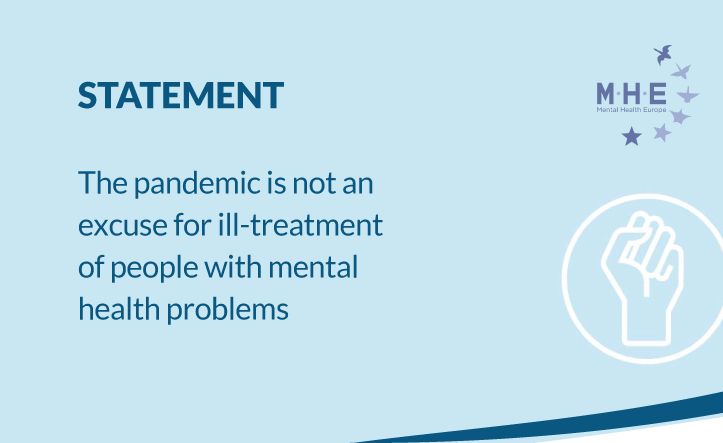The pandemic is not an excuse for ill-treatment of people with mental health problems

- Covid-19 pandemic unmasked the idea of the safe institution, calling for radical change
- On Human Rights Day, Mental Health Europe expresses concern about continued practices of ill-treatment in psychiatric institutions
On International Human Rights Day, Mental Health Europe released a statement expressing its concern about the continued use of ill-treatment in psychiatric institutions across Europe.
The Covid-19 pandemic underlines the call for a swift re-evaluation of mental health systems that rely on involuntary placement in psychiatric institutions. While institutionalisation in itself constitutes a violation of human rights, recent Disability Rights Monitor report shows that emergency measures due to the Covid-19 pandemic exacerbated conditions of people living in psychiatric institutions. The highest number of testimonies witnessing the denial of healthcare, not allowing visitors and the imposition of forced isolation once a local outbreak was confirmed, came from EU Member States, including Germany, Austria and France.
While some EU Member States aim to transform mental health systems through dedicated policies and legal reforms, negative attitudes and stigma persist. The continued work by the Council of Europe Bioethics Committee, aiming to establish a protocol (“Additional protocol to the Oviedo Convention”) that would breach human rights obligations, is the sad example of the link between mental health stigma and law development.
MHE’s Mapping and Understanding Exclusion report found that the regulation of ill-treatment varies greatly across Europe. England, Scotland, Ireland, Belgium, France and the Netherlands reported an increase in the use of coercion. Furthermore, several investigations conducted over the last years demonstrate grave human rights violations. The latest example is a report by the Council of Europe Committee for the Prevention of Torture following its ad hoc visit to Bulgaria. In several psychiatric hospitals the Committee documented persons being physically ill-treated by staff (slapped, pushed, punched, kicked, and hit with sticks). The report outlines that some persons maintained their legal capacity and consented to hospitalisation, however, have been denied to leave the premises or exercise outside, which can be interpreted as a form of detention. Thus, human rights violations are not only linked to involuntary admission but rather to the institution as a space with little accountability and transparency.
“Governmental negligence, lack of transparency and widespread corruption in Bulgaria lead to dire consequences, in this case in the care of mental health,” states Irina Atanasova, director of the Bulgaria-based mental health NGO “Skin – mental health platform” and member of Mental Health Europe. “The Ministry of Health confirmed that over 50% of mental health facilities are a in critical condition and the lack of qualified staff remains a major problem. Promises for investments and reforms were made, however, to this day, none of them were put into practice.”
“Different investigations over the years show that we have sufficient evidence of human rights violations that continue to take place in psychiatric settings”, says Jonas Bull, Research and Policy Officer at Mental Health Europe. “Instead of using slow legal reforms as an excuse, policy-makers should be inspired by positive examples around the world that successfully reduce and end coercion in mental health care. Developing such commitments must be the primary objective for 2021, particularly since the Covid-19 pandemic demonstrates the urgency of adequate mental health care when dealing with mental distress”.
Mental Health Europe urges the European Union and its Members States to continue the enactment of positive reforms in mental health care, in line with a human rights framework. Ending coercion in mental health requires implementing a new culture in which services promote recovery and emphasize the autonomy, empowerment and participation of service users in all Member States, in line with human rights principles.
For more information please contact Fatima Awil, Advocacy and Policy Officer at Mental Health Europe via f.awil@mentalhealtheurope.org. See our page on Human Rights HERE.
Stay connected
Get our latest news, personal stories, research articles, and job opportunities.

